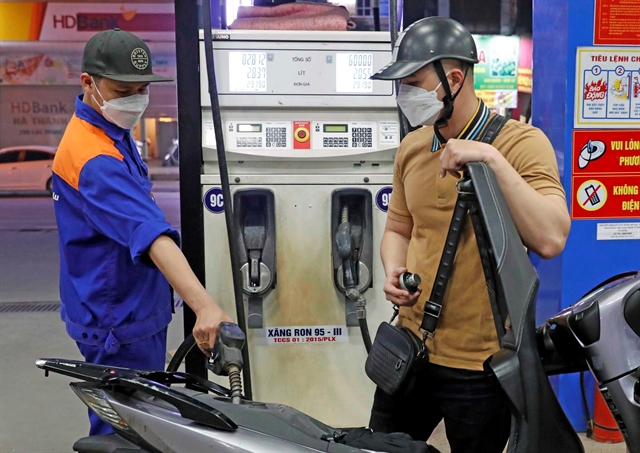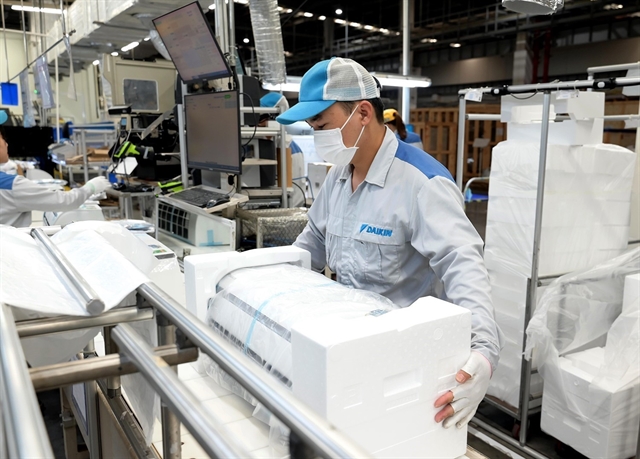Environmental pollution is on the rise, and without imposing a tax on petrol, it will be difficult to change consumer behavior, the minister stated. A special consumption tax on petrol has been in place since 1998.

HÀ NỘI — Việt Nam plans to impose a special consumption tax on petrol, or gasoline, as part of its strategy to fulfil environmental commitments, Finance Minister Nguyễn Văn Thắng said at the National Assembly session on May 9 that focused on the amended draft Law on Special Consumption Tax.
Environmental pollution is on the rise, and without imposing a tax on petrol, it will be difficult to change consumer behavior, the minister said. A special consumption tax on petrol has been in place since 1998.
He emphasised that transitioning to environmentally friendly alternatives, such as electric vehicles and public transportation, requires comprehensive policies, including fuel taxation.
Việt Nam’s commitment to achieving net-zero emissions by 2050, as pledged by the Prime Minister at COP26, underpins this move. While acknowledging the country’s economic challenges, minister Thắng said Việt Nam must align with international practices, noting that many developed nations impose various fuel-related levies such as CO₂ taxes and fees.
According to the minister, while environmental protection fees help fund environment-related projects, the special consumption tax primarily aims to influence consumer behaviour and raise budget revenue.
“Implementing both taxes complements each other and aligns with Việt Nam’s climate goals,” he said, adding that Việt Nam’s fuel tax rates remain lower than those in many other countries.
National Assembly deputy Hà Sỹ Đồng agreed with the view that petrol should be taxed, but emphasised that at present, it is the only product subject to both a special consumption tax and an environmental protection tax. In contrast, oil — a similar fuel used for vehicles — is currently only subject to the environmental protection tax.
“If the goal of taxing petrol is to mitigate environmental harm, then only the environmental protection tax should be applied. Therefore, I propose removing the special consumption tax on petrol,” he stated.
National Assembly deputy Nguyễn Trường Giang also supported this view, suggesting that the special consumption tax on petrol be removed and the environmental protection tax increased if necessary.
Notably, deputy Nguyễn Minh Tâm proposed adding plastic bags to the list of goods subject to special consumption tax, in order to support environmental protection goals and reduce the use of single-use plastic products.
According to several deputies, despite the Government's efforts and strong public awareness campaigns, the public’s habit of using plastic bags has shown little change or decline.
Minister Thắng stated that the current environmental protection tax on plastic bags is already at the maximum of VNĐ40,000 per kg, but welcomed further review to assess the effectiveness of fiscal measures in curbing usage.
The amended law also proposes steeper taxes on products harmful to public health. For alcohol over 20 per cent as well as beer, the Government suggests an annual 5 per cent tax increase. Specifically, from 2027 to 2031, the tax rate for this item will increase from 70 per cent to 90 per cent.
However, amid economic pressures and a national growth target of over 8 per cent, the National Assembly’s Economic and Financial Committee recommends a more moderate approach, still beginning in 2027.
Sugary soft drinks are also included in the new taxable list, with an 8 per cent tax starting in 2027 and increasing to 10 per cent by 2028.
The goal on imposing this tax is to combat rising rates of obesity and diseases related to high sugar consumption. The Government is studying international models and expanding the taxable product list as necessary.
Meanwhile, pickup trucks will see a gradual increase in tax of 3 per cent annually starting from 2027, rather than an immediate hike to 60 per cent, the rate applied to under-9-seat passenger cars, as initially proposed. This revision aims to support domestic businesses and maintain a favourable investment environment.

Tax on air conditioners
Regarding the taxation of air conditioners, the draft law proposes applying the special consumption tax to units with capacities between 18,000 and 90,000 BTU.
During the meeting, several National Assembly deputies recommended increasing the minimum taxable capacity. In response, the Minister of Finance stated that the Ministry would consider adjusting the threshold, potentially taxing only air conditioners with a capacity above 24,000 BTU and below 90,000 BTU.
The minister emphasised that taxation is not solely aimed at reducing electricity consumption.
He also noted that the Prime Minister has issued directives requiring that by 2045, household and commercial air conditioners using HCFCs and HFCs — substances harmful to the ozone layer — must be phased out, with production and imports prohibited.
Imposing a special consumption tax on air conditioners therefore remains necessary, particularly as the country seeks to discourage energy-intensive appliances.
However, the minister said high taxes may not significantly curb demand, since air conditioning remains essential for health and daily living in many regions.
Delegate Trần Văn Khải called for either abolishing this tax for this item or removing air conditioners with a capacity of under 90,000 BTU from the taxable list. If regulation is still deemed necessary, he proposed limiting the tax to only extremely high-capacity air conditioner systems.
Similarly, Giang also recommended raising the minimum taxable threshold to units above 24,000 BTU, because in urban areas, 24,000 BTU air conditioners are commonly used in apartments due to their efficiency and cost-effectiveness.
Deputy Phạm Văn Hòa pointed out the inconsistency of taxing household appliances while major pollutants like plastic products remain untaxed. — BIZHUB/VNS





